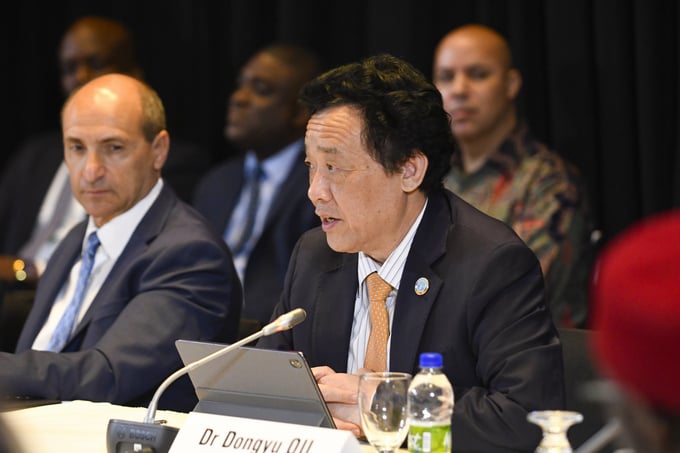June 18, 2025 | 01:22 GMT +7
June 18, 2025 | 01:22 GMT +7
Hotline: 0913.378.918
June 18, 2025 | 01:22 GMT +7
Hotline: 0913.378.918

The meeting in Barbados covered critical AMR topics such as financing, integrated surveillance and research and development.
Agrifood systems play a key role in limiting the spread of antimicrobial resistance (AMR) and the Food and Agriculture Organization of the United Nations (FAO) is fully committed to tackling what the UN lists as one of the top 10 threats for global health, FAO Director-General QU Dongyu today told the sixth meeting of the Global Leaders Group (GLG) on Antimicrobial Resistance.
The meeting in Bridgetown, Barbados, was the first time that members of the GLG, which is comprised of world leaders and experts, were able to gather in person due to the COVID-19 pandemic. Hosted by the Prime Minister of Barbados, Mia Amor Mottley, the meeting covered critical AMR topics such as financing, research and development, integrated surveillance, the role of the private sector, AMR and the environment and galvanizing political action to address AMR.
“FAO is fully committed to working with its partners to create more efficient, more inclusive, more resilient and more sustainable agrifood systems for better production, better nutrition, a better environment and a better life for all,” the Director-General said. Such agrifood systems transformation can now be better supported thanks to the inclusion of the AMR in the Pandemic Fund, he added.
The Director-General underlined the importance of a One Health approach to reducing the use of antimicrobials in the agrifood sector. One Health is an integrated, unifying approach that aims to sustainably balance and optimize the health of people, animals and ecosystems by recognizing that they are closely linked and inter-dependent.
FAO is currently preparing a 10-year global initiative to reduce the need for antimicrobials in agrifood systems. FAO has also developed the first version of the International FAO Antimicrobial Resistance Monitoring IT platform to address the existing information gap in agrifood systems.
In addition, FAO is hosting the AMR Multi-Stakeholder Partnership Platform, a mechanism to promote collaboration among a wide range of stakeholders at all levels across the One Health spectrum.
Looking ahead, the Director-General invited participants to a UN Food Systems Stocktaking Moment scheduled for July 24-26 at FAO's headquarters in Rome, in which AMR will be discussed.
AMR occurs when microorganisms such as bacteria, viruses, parasites or fungi become resistant to antimicrobial treatments to which they were previously susceptible.
Increasing use and misuse of antimicrobials and other microbial stressors (e.g. the presence of heavy metals and other pollutants) creates favourable conditions for microorganisms to develop resistance.
This in turn poses serious threats to human, animal, plant and environmental health, food safety, food security, and pandemic prevention, preparedness, and response.
AMR disproportionately affects low- and middle-income countries and contributes to almost 5 million deaths per year, according to the Global Research on Antimicrobial Resistance report. The World Bank estimates that in the next decade, AMR could result in a GDP shortfall of at least $3.4 trillion annually, and an additional 24 million people would be forced into extreme poverty by 2030 if no action is taken on AMR today.
(FAO.org)

(VAN) Extensive licensing requirements raise concerns about intellectual property theft.

(VAN) As of Friday, a salmonella outbreak linked to a California egg producer had sickened at least 79 people. Of the infected people, 21 hospitalizations were reported, U.S. health officials said.

(VAN) With the war ongoing, many Ukrainian farmers and rural farming families face limited access to their land due to mines and lack the financial resources to purchase needed agricultural inputs.

(VAN) Vikas Rambal has quietly built a $5 billion business empire in manufacturing, property and solar, and catapulted onto the Rich List.

(VAN) Available cropland now at less than five percent, according to latest geospatial assessment from FAO and UNOSAT.

(VAN) Alt Carbon has raised $12 million in a seed round as it plans to scale its carbon dioxide removal work in the South Asian nation.

(VAN) Attempts to bring down the price of the Japanese staple have had little effect amid a cost-of-living crisis.